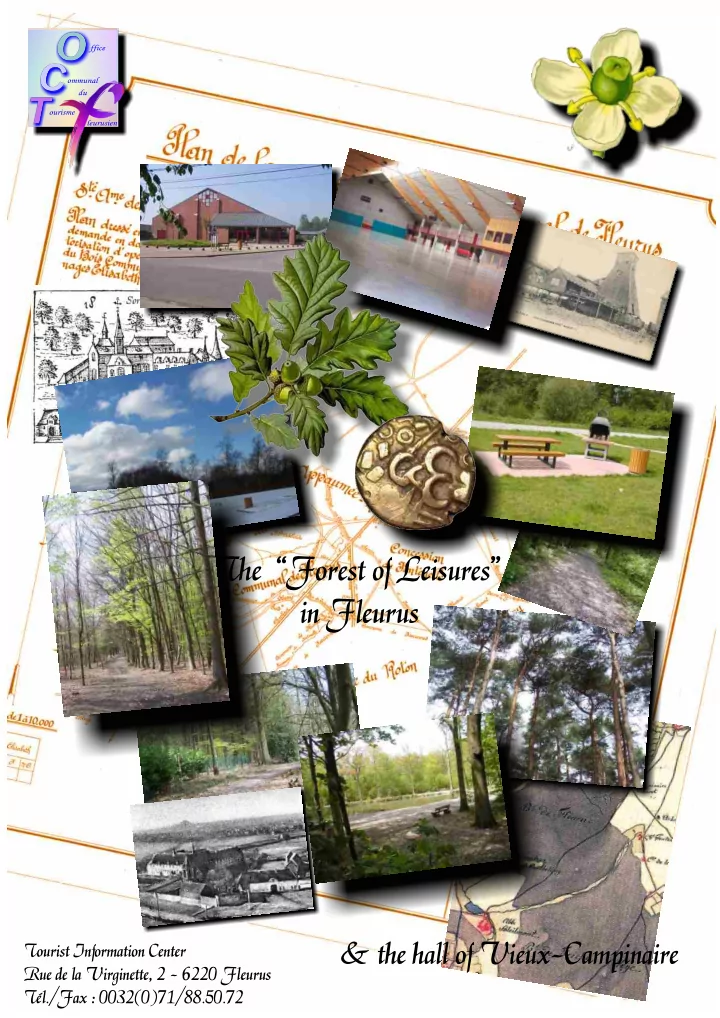

The “Forest of Leisures” in Fleurus & the hall of Vieux-Campinaire Tourist Information Center Rue de la Virginette, 2 - 6220 Fleurus Tél./Fax : 0032(0)71/88.50.72
The name of the city itself is probably a heritage of this time. According to former writers, Fleurus would draw Fleurus, or the obvious example its name from the fertility of its ground and its laughing campaigns (Floridum rus, flowered fields). If these invasions were dramatic for our ancestors, H istory, as it is taught to children, seems to be a they nevertheless provided the basis on which a new permanent, unchanging thing. world was going to be built. A precise and objective measuring instrument of the From that time on, the city of Fleurus gains an past. Reality is different. History, like any human reality, importance which the christianization of the country will is fluctuating. not contradict. It becomes a center for evangelization and is elected The enemies of yesterday are the allies of today and chief town of a vast deanery. the friends of tomorrow. The history of our Europe is the The first historical quote of the city dates back from most obvious evidence of this; the history of Fleurus, March the 28th 977. an obvious example. The chronicles of a close abbey report that the founder of this monastery passed away on that date in Fleurus. The history of the city and the villages around it begins In the course of the Middle-Ages, Fleurus keeps on some millenium before our era. developing. Located on one of these ways of migration . .. two fundamental elements of the local richness: which made it possible for our ancestors to conquer little by little the European space, the “Forest of Leisures” the entity of Fleurus was probably inhabited as soon as 5.000 years BC. and the historical inheritance. But the oldest signs of occupation are to be found in the first century BC, at the time of the Roman invasion carried out by Cesar A quiet and commercial city, it obtained from its lord the and the roman influence on the territory. rare privilege usually only granted to larger cities, to become a frank city. The roman highway, which borders the city on its northern part, and several roman buildings. The resulting development of the trade often causes the greediness of the soldiers passing by but the city does not find it necessary to protect itself with walls. During centuries to come, it will pay a high price for this decision. Between 1333 and 1707, the city is plundered, burned down and its population slaughtered almost 20 times. Why is it so ? The city is very well located; at the beginning of the valley of Sambre, on a way of natural penetration while coming from the south, the city occupies a key frontier position. One therefore often prefers to destroy it rather than to leave it intact in the hands of the enemy. The origin of the numerous cellars and underground passages running under the town centre is to be found in these events. What better way to protect its own goods than by hiding them underground out of sight? During the 17th century, the appearance of France in the foreground of the European powers will have a deep influence on the local history. Fleurus is not any longer an average city. If the geographical and geological chances did, all at the same time, the fortune and While the fortified town of Charleroi is meant to forbid the access to the brabançonnes plains in a direction the misfortune of Fleurus ... and the North of France in the other. Fleurus and its surroundings are the only right place To name a few, the farms of “Martinrou” and the for fightings on a large scale. “Baraque” which were probably founded at that time. In 1690, 1794 and 1815, our plains will see France play some of the most dramatic acts of its history. Roman antiquities that were discovered nearby allow this assumption.
Recommend
More recommend